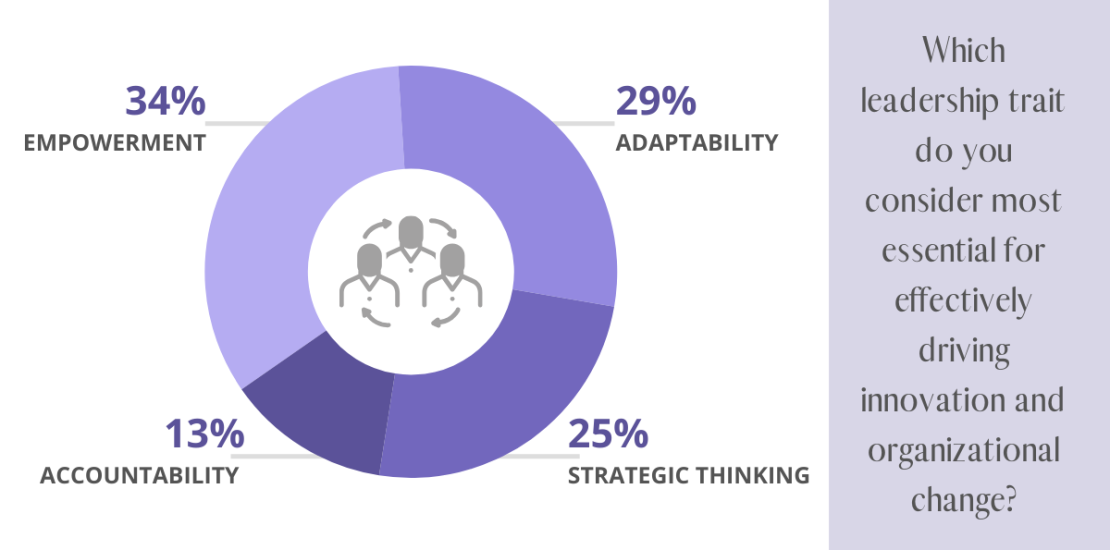What Leadership Traits Fuel Innovation
- July 19, 2024
- Posted by: Selen Warner
- Category: Blog

In today’s fast-paced world, innovation is crucial to the success of any organization, and leadership plays a vital role in fostering this innovation. The ability of leaders to guide their teams through the complexities of change and growth determines the overall success of their organizations. We wanted to understand which leadership trait our professional network considers most essential for effectively driving innovation and organizational change and polled our community for their insights.
Which leadership trait do you consider most essential for effectively driving innovation and organizational change? (single answer)
- Empowerment 34%
- Adaptability 29%
- Strategic thinking 25%
- Accountability 13%
According to the poll results, empowerment emerged as the most critical trait for driving innovation, receiving 34% of the votes. Empowering employees goes beyond delegation; it means entrusting them with the authority, resources, and confidence to take initiative and make decisions autonomously. This approach not only leverages diverse perspectives within the team but also fosters a sense of ownership and accountability for outcomes. When leaders empower their teams, they cultivate an environment where creativity and innovation can flourish organically. Empowered employees are more likely to experiment with new ideas, take calculated risks, and explore unconventional solutions, all of which are crucial for pushing boundaries and driving the organization forward in dynamic market landscapes. This leadership style also nurtures a culture of trust and collaboration, where individuals feel valued and respected for their contributions. By empowering their teams, leaders not only unlock the full potential of their workforce but also create a sustainable framework for continuous innovation and growth.
29% of participants chose adaptability. In an era where markets, technologies, and customer expectations evolve rapidly, leaders who can quickly adjust their strategies and approaches are invaluable. Adaptable leaders are not only open to change but are also proactive in anticipating shifts, ensuring their organizations remain competitive. This trait fosters a culture of continuous improvement and agility, which is essential for sustaining innovation over time. Furthermore, adaptability is crucial for managing uncertainty and unexpected challenges. Leaders who can pivot quickly and efficiently when faced with unforeseen circumstances are better equipped to maintain momentum and drive continuous improvement. The ability to adapt also encourages a growth mindset within the organization, where employees feel supported in experimenting, learning from failures, and iterating on their ideas. This dynamic environment is a breeding ground for innovation, as it allows for the refinement of methods, leading to more robust and creative solutions.
Strategic thinking garnered 25% of the votes. Leaders with strong strategic thinking skills can see the bigger picture and align their innovation initiatives with the long-term goals of the organization. They are adept at identifying opportunities, assessing risks, and making informed decisions that balance short-term gains with sustainable growth. Strategic thinkers provide a clear vision and roadmap for innovation, ensuring that efforts are focused resulting in meaningful and lasting change.
13% consider accountability as the most essential trait for driving innovation. However, this does not diminish its importance. Accountability ensures that leaders and their teams are responsible for their actions and outcomes. It fosters a culture of transparency and reliability, which is crucial for maintaining trust and credibility within the organization. While it may not be the leading trait for sparking innovation, accountability is vital for sustaining and scaling innovative efforts by ensuring that all initiatives are executed with integrity and followed through to completion.
The poll results highlight the multifaceted nature of leadership in driving innovation and organizational change. Adaptability, empowerment, strategic thinking, and accountability each play a unique role in fostering a culture of innovation. By balancing these traits, leaders can effectively navigate the complexities of change, inspire their teams, and ensure the continuous growth and success of their organizations.
In your opinion, which leadership trait is most essential for effectively driving innovation and organizational change? Please share with us.

